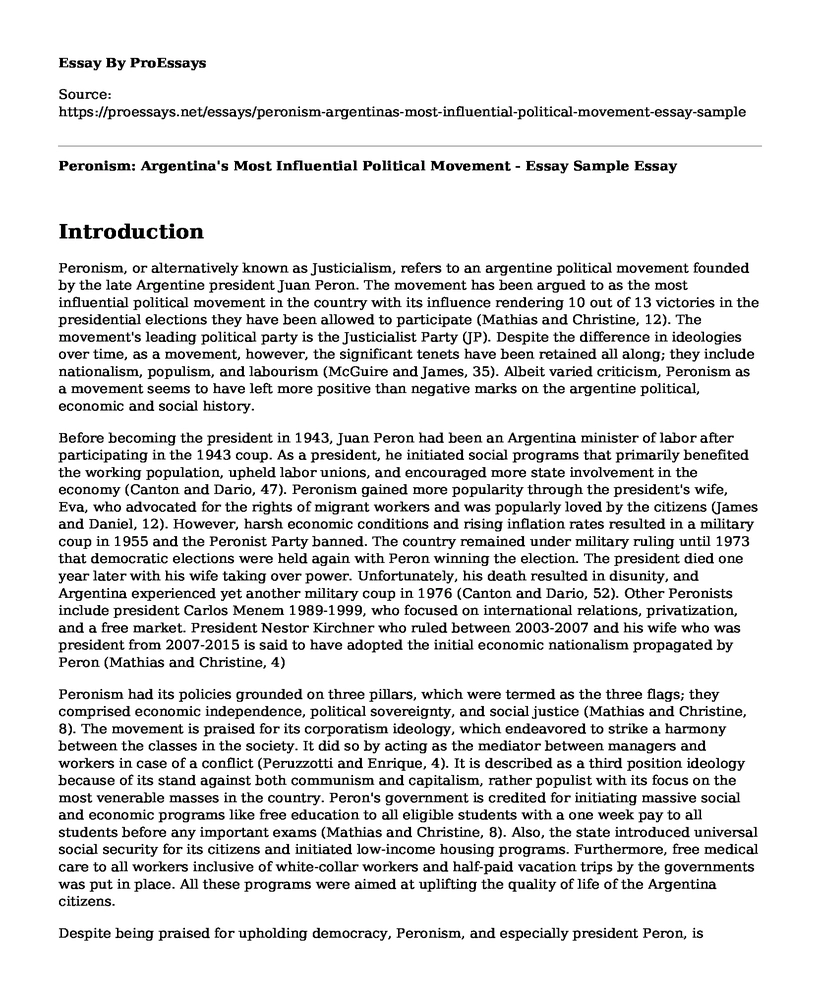Introduction
Peronism, or alternatively known as Justicialism, refers to an argentine political movement founded by the late Argentine president Juan Peron. The movement has been argued to as the most influential political movement in the country with its influence rendering 10 out of 13 victories in the presidential elections they have been allowed to participate (Mathias and Christine, 12). The movement's leading political party is the Justicialist Party (JP). Despite the difference in ideologies over time, as a movement, however, the significant tenets have been retained all along; they include nationalism, populism, and labourism (McGuire and James, 35). Albeit varied criticism, Peronism as a movement seems to have left more positive than negative marks on the argentine political, economic and social history.
Before becoming the president in 1943, Juan Peron had been an Argentina minister of labor after participating in the 1943 coup. As a president, he initiated social programs that primarily benefited the working population, upheld labor unions, and encouraged more state involvement in the economy (Canton and Dario, 47). Peronism gained more popularity through the president's wife, Eva, who advocated for the rights of migrant workers and was popularly loved by the citizens (James and Daniel, 12). However, harsh economic conditions and rising inflation rates resulted in a military coup in 1955 and the Peronist Party banned. The country remained under military ruling until 1973 that democratic elections were held again with Peron winning the election. The president died one year later with his wife taking over power. Unfortunately, his death resulted in disunity, and Argentina experienced yet another military coup in 1976 (Canton and Dario, 52). Other Peronists include president Carlos Menem 1989-1999, who focused on international relations, privatization, and a free market. President Nestor Kirchner who ruled between 2003-2007 and his wife who was president from 2007-2015 is said to have adopted the initial economic nationalism propagated by Peron (Mathias and Christine, 4)
Peronism had its policies grounded on three pillars, which were termed as the three flags; they comprised economic independence, political sovereignty, and social justice (Mathias and Christine, 8). The movement is praised for its corporatism ideology, which endeavored to strike a harmony between the classes in the society. It did so by acting as the mediator between managers and workers in case of a conflict (Peruzzotti and Enrique, 4). It is described as a third position ideology because of its stand against both communism and capitalism, rather populist with its focus on the most venerable masses in the country. Peron's government is credited for initiating massive social and economic programs like free education to all eligible students with a one week pay to all students before any important exams (Mathias and Christine, 8). Also, the state introduced universal social security for its citizens and initiated low-income housing programs. Furthermore, free medical care to all workers inclusive of white-collar workers and half-paid vacation trips by the governments was put in place. All these programs were aimed at uplifting the quality of life of the Argentina citizens.
Despite being praised for upholding democracy, Peronism, and especially president Peron, is criticized for undermining freedom by nationalizing the broadcasting system, monopolizing the supply of newspapers and centralizing the control of unions under him (Peruzzotti and Enrique, 4). The movement is also accused of organized violence and dictatorship by terming opposition as traitors and agents to foreign powers. Arguably, the most extreme actions by the party include the imprisonment of journalists and closing of opposition papers like La Prensa (Canton and Dario, 68). The movement is also viewed as authoritarian by opponents with Peron characterized as a fascist dictator and his policies termed as populist. On the contrary, it is evident that the movement, albeit its flaws, still hold a massive appeal among the Argentina citizens.
Works Cited
Brennan, James P. Peronism and Argentina. Rowman & Littlefield, 1998.
Fennell, Lee C., and Dario Canton. "Materiales para el estudio de la sociologia politica en la Argentina." The Hispanic American Historical Review, vol. 50, no. 1, 1970, p. 197.
James, Daniel. Resistance and Integration: Peronism and the Argentine Working Class, 1946-1976. Cambridge UP, 1993.
Mathias, Christine. "The First Peronists: Indigenous Leaders, Populism, and the Argentine Nation-State." Journal of Social History, 2019.
McGuire, James W. Peronism Without PerA3n: Unions, Parties, and Democracy in Argentina. Stanford UP, 1999.
Peruzzotti, Enrique. "Peronism and the Birth of Modern Populism." Journal of inter-regional studies: regional and global perspectives (2019): 4.
Cite this page
Peronism: Argentina's Most Influential Political Movement - Essay Sample. (2023, May 04). Retrieved from https://proessays.net/essays/peronism-argentinas-most-influential-political-movement-essay-sample
If you are the original author of this essay and no longer wish to have it published on the ProEssays website, please click below to request its removal:
- The Republican Experiment 1783-1789 Essay
- Article Review on Bench Mark for Cultural Competence
- The Nuclear Arms Race - Essay Sample
- Essay Example on Nationalism: A Political and Emotional Expression of Identity.
- Essay Example on Donald Trump's Speech: An Analysis of US Education Systems
- Paper Example on COVID-19: Global Economic Crisis - Millions Infected, Businesses Counting Losses
- Paper Example on Protecting Civil Liberties: A Crucial Role in American Society







